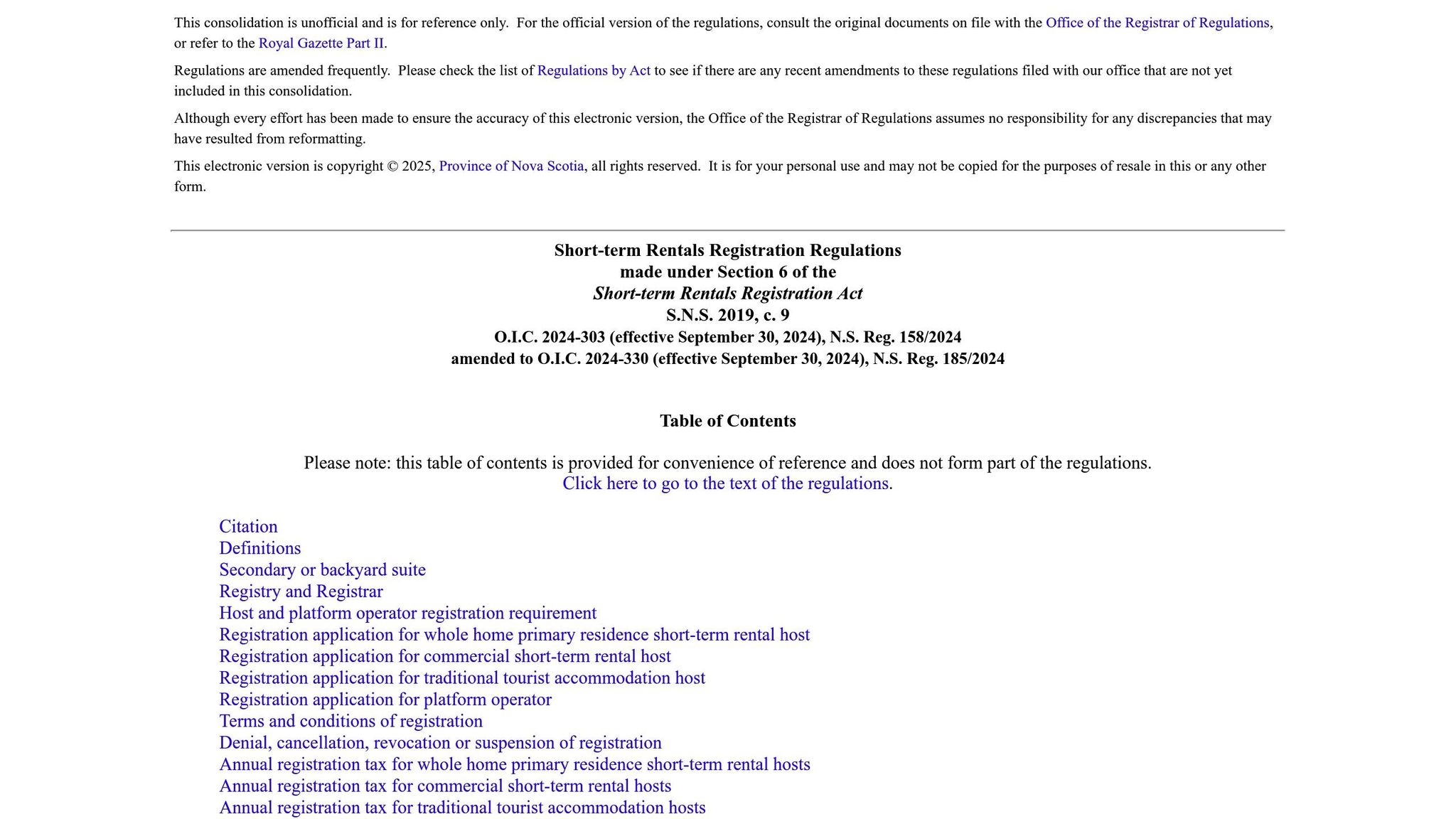Short-Term Rental Regulations in Nova Scotia: South Shore (Lunenburg, Mahone Bay, Bridgewater, etc.)
Nova Scotia's South Shore has introduced stricter short-term rental rules to address the housing crisis and ensure compliance for property owners. Here's what you need to know:
- Provincial Rules: Annual registration under the Short-term Rentals Registration Act is mandatory, with fees based on property type (e.g., $50 for primary residences, $500 for commercial properties). Registration numbers must be displayed on all listings.
-
Municipal Requirements: Each town has additional rules:
- Lunenburg: Development Permit (free) and Zoning Confirmation Letter ($60.90) required.
- Mahone Bay: Land-use compliance check needed.
- Bridgewater: Rentals must be at least 30 days; strict enforcement in place.
- Penalties: Non-compliance can lead to fines up to $100,000.
- Taxes: A 3% marketing levy applies in some areas.
To stay compliant, ensure your property meets both municipal and provincial guidelines, register annually, and maintain proper documentation. Non-compliance risks hefty fines and operational issues.
Halifax Approves New Short-Term Rental Regulations
Nova Scotia's Main Rental Rules
Nova Scotia's provincial framework builds on municipal regulations to define how short-term rentals operate.
Short-term Rentals Registration Act

The Short-term Rentals Registration Act (STRRA), effective September 30, 2024 [1], outlines rules for property owners in the South Shore offering accommodations for 28 days or less [5].
Here’s what’s required:
- Annual registration renewals due by April 1st
- Unique registration numbers for each property
- Display registration numbers on all online listings
- Adherence to municipal land-use bylaws
Minister John Lohr has emphasized the importance of these measures in tackling the housing shortage [4].
The Act also categorizes hosts and sets registration fees based on property type.
Types of Hosts and Registration
The STRRA divides short-term rentals into three categories, each with specific fees:
| Host Category | Description | Annual Fee |
|---|---|---|
| Primary Residence | Owner's main living space | $50 (1–4 bedrooms), $150 (5+ bedrooms) |
| Commercial | Properties in Lunenburg, Mahone Bay, and Bridgewater | $500 |
| Traditional Tourist | Hotels, B&Bs, and unique lodging | $50 (1–4 bedrooms), $150 (5+ bedrooms) |
Additional requirements include:
- Proof of primary residence (if applicable)
- Consent from property owners (for tenants)
- Approval from condo boards (if needed)
- Proof of compliance with municipal land-use regulations
Taxes and Rule Enforcement
Failing to follow these rules can result in fines ranging from $1,000 to $100,000 per violation [2].
Tax-related measures include:
- A 3% municipal marketing levy in the District of Lunenburg [3]
- Oversight by the Canada Revenue Agency for expense deductions [7]
As of July 23, 2024, 7,193 short-term rentals have been registered in Nova Scotia [4], showing widespread adherence to the regulations. Note that registration fees are non-refundable unless the Minister determines a payment error occurred [6].
Local Rules by Town
Each South Shore town has its own set of rules for short-term rentals. These local requirements go beyond provincial guidelines, adding specific permits, fees, and enforcement measures.
Lunenburg Rules and Permits
In Lunenburg, property owners must obtain two key documents: a free Development Permit and a $60.90 Zoning Confirmation Letter. These are essential for protecting property investments and ensuring compliance.
For properties in heritage areas, owners need to submit a Heritage Development Encroachment Application Form along with a floor plan and a written request. If you already have a Development Permit, simply provide a copy. The processing time for these documents is about 14 days [3][8].
Mahone Bay Rules and Licenses
Mahone Bay relies on its Municipal Planning Strategy (MPS) and Land Use By-law (LUB) to regulate short-term rentals. These documents specify approved zones, development conditions, and operational limits. Before registering with the province, property owners must confirm land-use compliance with the municipality [6][9]. This system reflects efforts to balance rentals with community priorities.
Bridgewater Rules and Enforcement
Bridgewater takes a strict approach to managing short-term rentals. Here's an overview of their key regulations:
| Aspect | Details |
|---|---|
| Minimum Stay | Rentals must be for at least 30 days [10]. |
| Enforcement | Zoning and construction officers actively monitor compliance [10]. |
| Penalties | Fines for non-compliance can reach up to $100,000 [4]. |
| Coverage | Enforcement started in the R-50 zone but will expand township-wide [11]. |
In summer 2023, officials cracked down on violations after receiving complaints from Gateshead Drive residents [10]. Bridgewater's rules are designed to preserve neighborhood quality while keeping short-term rental operations in check.
sbb-itb-16b8a48
How to Follow the Rules
Managing Different Town Rules
It's important to comply with both provincial and municipal rules for short-term rentals. Start by registering each property with the local municipal office before proceeding with provincial registration.
Here’s a quick overview of key municipal requirements:
| Town | Requirements | Processing Time | Contact Method |
|---|---|---|---|
| Lunenburg | Development Permit (no fee) and Zoning Confirmation Letter ($60.90) | About 14 days | Email: permits@townoflunenburg.ca or visit Town Hall |
| Mahone Bay | Land-use compliance confirmation | Varies | Contact the municipal office |
| Bridgewater | Check local zoning or occupancy guidelines | Varies | Contact the township office |
Once you’ve met these municipal requirements, gather the necessary documents and insurance to finalize your registration.
Documentation and Insurance
You’ll need the following documents to complete your registration:
- Proof of ownership or authorization
- Residency documents, if required
- Valid building permit
- Occupancy permit
- Zoning confirmation letter
- Development permit (if applicable)
- Updated insurance policy that covers rental activities
Guest Rules and Screening
To stay compliant, follow these guest management practices:
- Include your registration number on all listing platforms
- Verify that guest IDs match the booking information
- Keep accurate records of all guests
- Follow local occupancy limits
- Collect and document applicable fees and taxes
Failure to comply can lead to steep fines. The province uses external services to monitor compliance, so ensure your documentation and guest management practices are always up to date.
Rules and Property Investment
Understanding local regulations and revenue potential is key to making informed property investments in Nova Scotia's South Shore.
Town Rules Comparison
Different municipalities have unique rules and market conditions that investors need to consider. For example, Tier 2 registration for commercial short-term rentals involves an annual fee of $500 CAD.
| Town | Key Requirements | Market Data |
|---|---|---|
| Lunenburg | Development Permit and Zoning Confirmation Letter ($60.90 fee) | 68% occupancy, CA$201 average daily rate |
| Mahone Bay | Land-use compliance check | Growing tourism market |
| Bridgewater | Zoning verification | Limited data available |
These regulations are essential for shaping your rental strategy.
Short vs. Long-term Rentals
In Lunenburg, short-term rentals average 248 booked nights per year, earning hosts approximately $48,000 CAD in 2023 [12]. Here's a quick comparison:
- Short-term rentals: Higher monthly income potential and more flexibility but face stricter regulations.
- Long-term rentals: Steady income, lighter regulations, and contribute to the housing supply.
Regulatory changes could impact both strategies, so it's wise to keep future trends in mind.
Future Rule Changes
The market is influenced by two major factors:
- A projected housing shortage of 41,200 units by 2027/28 [2].
- A 14% increase in tourism, with 2.2 million visitors in 2023 boosting rental demand [2].
Helio Urban Development is addressing rental needs with new construction priced at $168 per square foot, designed for income-generating properties.
"Nova Scotians need housing. We know many houses and apartments that could potentially be long-term homes are being rented short term. We're working to get more homes built. In the meantime, these changes will help address the urgent need for housing now." - John Lohr, Minister of Municipal Affairs and Housing [4]
Investors should weigh these market conditions and regulations carefully when deciding between short- and long-term rental options.
Summary
This section outlines the key rules and steps needed for successful short-term rental investments on Nova Scotia's South Shore.
Main Rules to Remember
To operate legally, you must comply with both provincial and municipal regulations. Here's an overview:
| Requirement Type | Details | Due Date |
|---|---|---|
| Provincial Registration Fee | Primary residence: $50 (up to 4 bedrooms) Commercial Tier 2: $500 annually |
September 30 |
| Municipal Compliance | Development Permit or Zoning Letter Land-use bylaw verification |
Before registration |
| Marketing Levy | 3% fee collected from guests | Ongoing |
Make sure your registration number is included in all listings. Failing to comply can result in fines ranging from $1,000 to $100,000 per violation [2].
Next Steps for Investors
Follow these steps to streamline the management of your rental property:
-
Start with Municipal Requirements
Reach out to your local municipal office to obtain necessary documents, such as proof of ownership, land-use compliance, and, if applicable, residency verification. -
Complete Provincial Registration
Use the official provincial portal to submit your application. Include all required documentation, such as municipal compliance confirmation and insurance certificates. -
Keep an Eye on Regulations
Stay informed about potential changes to housing policies or updates to the Short-Term Rental Registration Act (STRRA).
Regularly check official resources to ensure your property remains compliant and operates smoothly.
